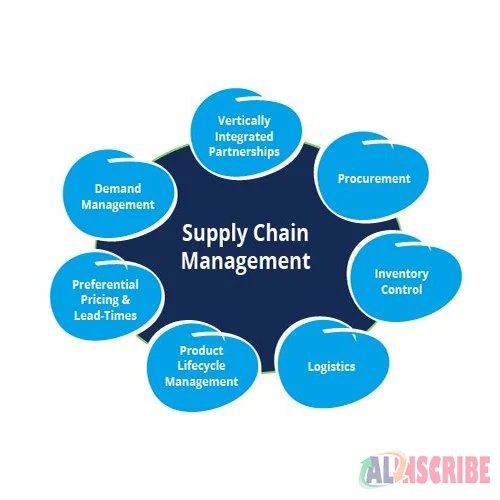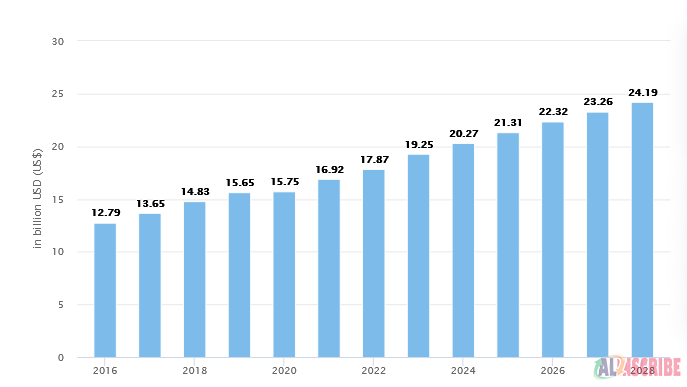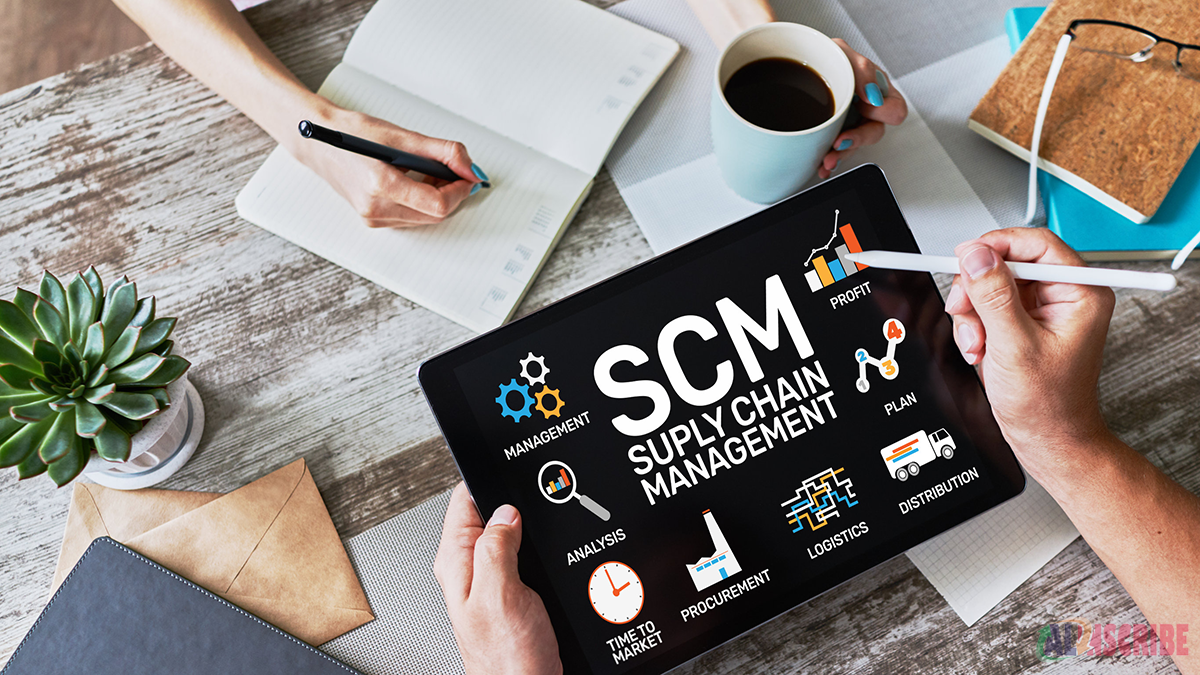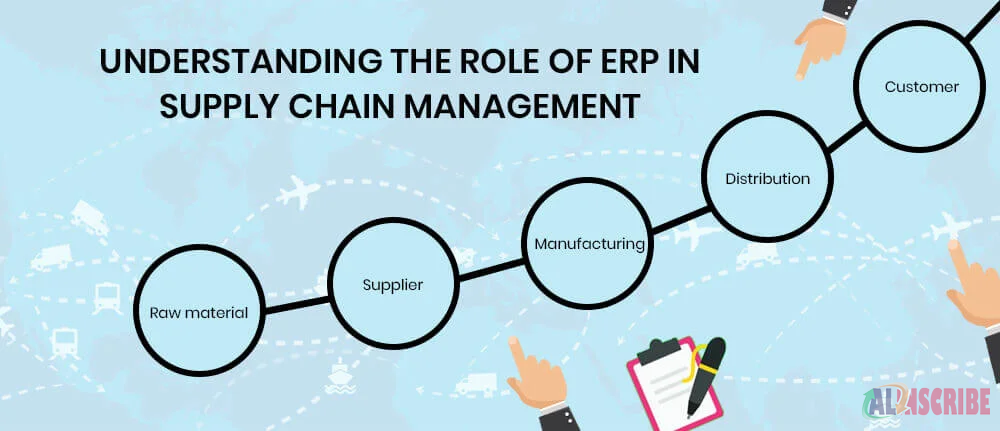How Supply Chain Management Can Be Controlled Using ERP Software

Supply chain management is one of the most crucial aspects of a manufacturing business, it is one of the factors to be the toughest to manage as well. Manufacturing businesses rely on supply chain primarily to get their job done. However, this supply chain management is a factor to have several concerns during this post-pandemic period. According to 2021 state manufacturing report, 94% of the manufacturing companies have reported concerns regarding their supply chain management practice.
55% of the companies agreed to face increase in IT risks in digital operations. 53% of the companies have reported to face concerns regarding quality performance with existing suppliers. 47% of them agreed to the fact that supply chain management overhead costs are too high. 42% of the companies faces concern regarding IP protection risks. 31% faces lack of visibility into operations, which creates risks and uncertainty. Additionally, 45% of the respondents have reported to face internal process hamper due to rigid systems. Thus, it is clear that the manufacturing companies face a significant number of troubles when it comes to supply chain management and these troubles comprise of both technical and non-technical short-comings. In the end 97% of the respondents have agreed to the fact that supply chain management takes up majority of an employee’s working hours.
In this scenario, manufacturing companies are in dire need of automating supply chain management processes with the help of an efficient tool. And supply chain management ERP software is that said tool. Implementation of a supply chain management ERP software can help in reducing the needed time for managing supply chain, eliminating risk factors and enhancing communication within the supply chains. Nevertheless, there are more to it all. Supply chain management ERP software plays a huge role in optimizing supply chain and extracting as much benefit as possible. In order to explain the implications of supply chain management ERP software, we have prepared this article. Here we will discuss the definition, the importance and the benefits of supply chain management ERP software. Hence, keep reading this article to gain some valuable insights on this topic.
The definition and importance of supply chain management ERP software
Supply chain management ERP software is a kind of solution that is capable of automating complex supply chain processes, implementing better visibility and enhance performance and communication. The primary set of tasks to be performed by supply chain management ERP software are analysis of demand, sourcing materials, manufacturing products and distributing those among all the distribution points. Advanced supply chain management ERP software are capable of managing planning, procurement, manufacturing and inventories. By implementing ERP software, the manufacturing companies can establish a more streamlined and organized workflow within the course of their supply chain.
Supply chain management ERP software are capable of storing all the important business related data within one database, which is easily accessible through a single instance. Supply chain managers easily gain a unified view of all the operations performed within the supply chain. They can easily integrate that data with the financial modules offered by the supply chain management ERP software and save a lot of time and effort. This capability of integration not only saves times and effort but also reduces risks of errors that can easily take place while handling multiple software to manage different supply chains.
The smooth and seamless flow of information that supply chain management ERP software implements helps team in collaborating easily and efficiently. They can easily access accurate data regarding supplier’s contacts, customer demands and supplier capabilities, which will lead them towards determining the right amount of raw materials to be procured and the necessary amount of materials to be ordered for meeting customer demands while keeping costs under consideration. Moreover, the managers can also gain a 360 degree view of supply chain performance and determine important strategies to help everything perform better.

According to Statista, the market of supply chain management ERP software is estimated to witness its all time high during the year of 2028. In 2016 the market generated an accumulated revenue of $12.79 billion. Currently in 2023, the market is estimated to see a growth of $19.25 billion by the end of the year. And in 2028, the market is estimated to reach a revenue generation of $24.19 billion. Therefore, it is safe to say that supply chain management ERP software market can show promising results if the manufacturing business owners realize how important it is for their business growth.
Benefits to be acquired by using supply chain management ERP software
Supply chain management ERP software plays a huge role in integrating all the supply chain management processes within a single interface, which promotes more flexibility and better agility within the company. This flexibility and agility brings in a number of added benefits. Some of these benefits are discussed below.
Enhanced flexibility
Flexibility is undoubtedly one of the most important elements to be associated with modern supply chain. It is crucial for the companies to react fast to the rapid shifts in supplier capacity and customer demands. Supply chain management ERP software offers predictive analysis, which helps the supply chain managers in planning their capabilities according to the circumstances. It also helps in identifying and addressing potential risks before any disruption takes place within the operation.
Less number of IT issues
Implementation of supply chain management ERP software streamlines IT with supply chain operations. The supply chain managers do not need to face the complexity of managing different software or applications for different supply chains. Therefore, there are less hustle during data integration as the managers can seamlessly access data individually in real-time.
Reduction of costs
Supply chain management ERP software certainly enhances visibility, with the help of which the companies can optimize their inventories. They can buy enough stock rather than overstocking, which certainly saves cost as well as errors. Automation of several business processes also reduce the operational costs by a significant amount.
Automation of workflow
Cloud-based supply chain management ERP software are capable of automating workflow like never before. ERP systems establish a smooth flow of data within different departments. It accelerates supply chain processes and reduces the need for manual effort. Systems can automatically alert purchasing groups when the materials fall beyond predetermined thresholds, which certainly saves a lot of manual efforts and time of the supply chain managers.
Improved performance
Implementation of supply chain management ERP software enhances overall performance of the company by implementing better management and workflow. There is an integration that works among the departments and allow them to collaborate better and faster. The stakeholders can make better and more informed decisions. The company’s growth is influenced by the company directly or indirectly by the supply chain management ERP software.

Areas to improve with ERP and supply chain integration
Supply chain management ERP software can prove to be a spectacular decision made by the manufacturing companies if they know how to put it in work properly. Starting from planning to procurement, everything can be automated effortlessly with the incorporation of supply chain management ERP software. in this section of the article, we have presented some areas which can be improved with the integration ERP and supply chain integration.
Planning
Planning capabilities of an organization can be easily enhanced with the implementation of supply chain management ERP software. Implemented ERP systems can enable companies to predict inventory requirements as well as production requirements based on historical demands. Supply chain management ERP software is capable of scheduling manufacturing to meet the volume of customers’ orders. It also stores all the machinery related data and helps in much smoother production.
Purchasing
Supply chain management ERP software automates purchasing by reducing the need for manual and paper-based purchasing process. It helps in reducing costs and making the entire process less time-consuming. Automated purchase orders can be renewed automatically. The managers can also gain a clearer view of all the purchases while tracking purchase orders with ease.
Procurement
Supply chain management ERP software allows the supply chain managers to manage the entire procurement process centrally. They can evaluate and approve suppliers while managing supplier bids within a single instance. The cost of using separate procurement software can be eliminated as well. With the help of dashboards and real-time reporting the performance of the suppliers can easily be monitored. Thus, the implementation of supply chain management ERP software certainly makes complicated procurement processes quite easy to manage.
Execution of supply chain
Establishing a supply chain management ERP software will allow you to manage complicated production processes, manufacturing resources, coordination of inventories, management of logistics in order to ensure on-time delivery. Supply chains managers gain a better insight of all the production stages starting from sales orders to delivery completion.
Monitoring
Traditional processes require to pull and consolidate data from different sources. This procedures usually takes up a lot of time. Moreover, it is easy to make mistakes while incorporating data manually. Gaining up-to-date data is almost impossible when you opt for this process. On the other hand, supply chain management ERP software allows the supply chain managers to monitor performance and data in real-time. Real-time monitoring allows them to mitigate existing issues quickly and retain customers’ trust.
Maintenance
With the help of asset management modules integrated in supply chain management ERP software, the companies can keep track of equipment utilization. Scheduling maintenance gets easy with the help of ERP integration as well. Monitoring asset cost is another factor that can be performed with ease by implementing supply chain management ERP software.
Measurement
The success of supply chain management depends heavily on collecting, analyzing and gaining actionable insights from data. With the help of supply chain management ERP software, you can acquire an insight of extensive measurement as well as reporting capabilities. You can easily collect data from internal and external sources. Companies are also offered to use customizable dashboards, reports for monitoring KPIs and supply chain metrics.

Communication and collaboration
Supply chain management ERP software are capable of establishing better collaboration and communication with both internal and external sources. Production, sales, procurement and inventory management teams share data in real-time, which makes it easier for them to work under a rhythm and extract desired outcomes from the collaboration.
Managing inventory
Smart inventory management is one of the features of supply chain management ERP software. It manages the right amount of inventory for production processes. Auto reordering and alert for stock-refill make the course of inventory management easier than ever.
Warehouse management
Running warehouses more efficiently comes hands in hands with the implementation of supply chain management ERP software. With the WMS system so the supply chain management ERP software you can optimize warehouse space, track productivity, monitor inventory and improve picking and packing processes effectively.
MRP (Material Requirements Planning)
Supply chain management ERP software is capable of determining the quantities of inventory including raw materials that are needed for meeting the demand. With advanced supply chain management ERP software, you can easily optimize production and delivery while keeping consideration of circumstantial impacts.
Choosing the right supply chain management ERP software
Since the course of supply chain management ERP software is being globally accepted, there are now more than 500 software offering ERP integration with your supply chain management. Hence, it is totally natural to get confused while choosing software for your own supply chain operations. In this scenario, you need to consider some criteria before choosing the right software for you. Some of the most important criteria when choosing supply chain management ERP software are listed below.
- Flexibility and agility
- Ability to integrate with third-party application
- AI powered data insights
- Real-time visibility
- Inventory and warehouse management tools
- Price
Conclusion
It should be quite clear from the discussion that supply chain management ERP software are a must-have for all kinds of manufacturing businesses. The implementation of ERP software possesses the capabilities of enhancing the performance of a supply chain by ten times. Thus, considering its help and incorporating the same within your business processes will certainly be a win for you. However, you need to consider all the challenges that you might face during the initial stages of implementation. Once you overcome those, nothing can stop your business from reaching its heights with the help of the supply chain management ERP software.
Article Comments
Similar Articles
Articles Search
Sponsor
There are zero sub-categories in this parent category.
There are zero sub-categories in this parent category.
There are zero sub-categories in this parent category.
















